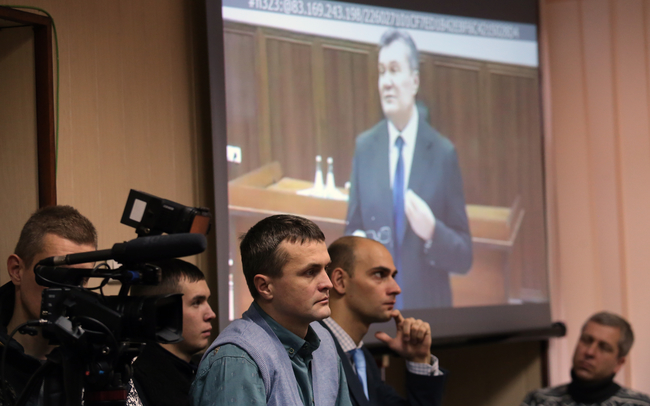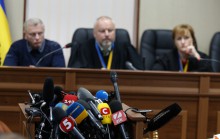On Monday, November 28, the Sviatoshyn District Court managed to conduct an interrogation of former president of Ukraine Viktor Yanukovych as demanded by his lawyers. The story of this interrogation has left a number of questions open. In particular, how did it happen that the fugitive president was given the opportunity to actually use a teleconference as an information platform? The government has strongly hinted that it considers this fact a mistake. So, was not this setback a warning bell for the current government, for which the interrogation turned out to be a surprise for some reason? To prove that the Ukrainian side was obviously confused, it is enough to recall the inability of law enforcement to deliver five Berkut riot police suspects to the court on November 25, which resulted in the interrogation being postponed to November 28, while Yanukovych still used the aborted hearing as a pretext for a press conference. It was during that event that he demonstrated to the public three folders allegedly containing relevant evidence which proves his innocence.
Judging from Yanukovych’s behavior in court on November 28, he had long been preparing to deliver a speech on the events of the winter of 2013-14. While doing so, the former president mentioned a few opinions which had been repeatedly discussed by the public. In particular, people talked about possible involvement of Serhii Liovochkin in the Euromaidan dispersal on November 30, 2013. Yanukovych said that “the Firtash-Liovochkin group supported the opposition during the revolution.” The overt attack against an STB journalist, in which phrases like “I know who your boss is” were used on November 25, also exposed hidden conflicts in the relationship between Yanukovych and individual clans in Ukraine which might have played a part in the former president’s flight from the country.

ON MONDAY, NOVEMBER 28, THE SVIATOSHYN DISTRICT COURT MANAGED TO CONDUCT AN INTERROGATION OF FORMER PRESIDENT OF UKRAINE VIKTOR YANUKOVYCH. AT THE VERY BEGINNING OF THE INTERROGATION, THE COURT ANNOUNCED A TECHNICAL BREAK FOR 15 MINUTES, WHICH ALLOWED PROSECUTOR GENERAL OF UKRAINE YURII LUTSENKO TO SERVE YANUKOVYCH WITH A NOTIFICATION OF SUSPICION OF HIGH TREASON / Photo by Artem SLIPACHUK, The Day
At the very beginning of the interrogation, the court announced a technical break for 15 minutes, which allowed Prosecutor General of Ukraine Yurii Lutsenko to serve Yanukovych with a notification of suspicion of high treason. In particular, Lutsenko told the Sviatoshyn District Court in Kyiv: “Yanukovych committed high treason... to assist the Russian Federation in its violation of the sovereignty and territorial integrity of Ukraine, hoping to get support and protection from the authorities of the Russian Federation for obtaining long-term residence in that country and evading criminal prosecution in Ukraine... Given that Yanukovych is outside Ukraine and is effectively hiding from Ukraine’s law enforcement, the suspicion has been announced verbally, and the notification thereof was mailed an hour ago to all known addresses where Yanukovych stayed lately, and will be served... on the latter’s lawyer as well.” The prosecution has really conclusive evidence on that count, because Yanukovych did issue statements asking the aggressor country for military assistance.
In turn, lawyer Ihor Fedorenko said: “I hope as a lawyer that you have met the burden of the procedure of suspect notification, as provided by law. I hope you understand that serving a copy of that document on one’s lawyer is not really a notification of suspicion, personal announcement, but only serving a copy on a lawyer.” Such procedural niceties and formalities may end up being used by Yanukovych’s legal defense team to refute seemingly undeniable evidence of his crimes.
Having notified the suspect, Lutsenko made a political statement in which he, acting now “as a regular citizen of Ukraine,” accused the former president not only of the dispersal of the Euromaidan, but also of playing a part in the Russian aggression. The political statements certainly added a demagogic flavor to the proceedings, which can be interpreted as reflecting a personal dislike, after all.
“To begin with, questioning individuals, who are in another country, in a Ukrainian court of law, using Skype, is against the law and, therefore, inadmissible,” Mykola Siryi, senior fellow with the National Academy of Sciences’ Koretsky Institute of State and Law, told The Day. He went on to say that this kind of questioning cannot be legally valid and that “this runs counter to the Convention on Mutual Assistance in Criminal Matters. Needless to say, each such questioning in court is aimed at making sure the person being questioned is telling the truth; also, at ascertaining the circumstances in the case, whether some or other actions can be subject to criminal prosecution. In my opinion, the questioning that took place was a political dialog, not a questioning in terms of criminal law. They started by sending a statement to the Russian Federation, expressing suspicion that Viktor Yanukovych was guilty of crimes. The Russian side rejected the statement. In view of this, questioning him as witness while on Russian territory was illogical. And the whole affair is proof of the [Ukrainian] prosecution’s lack of professionalism.”








